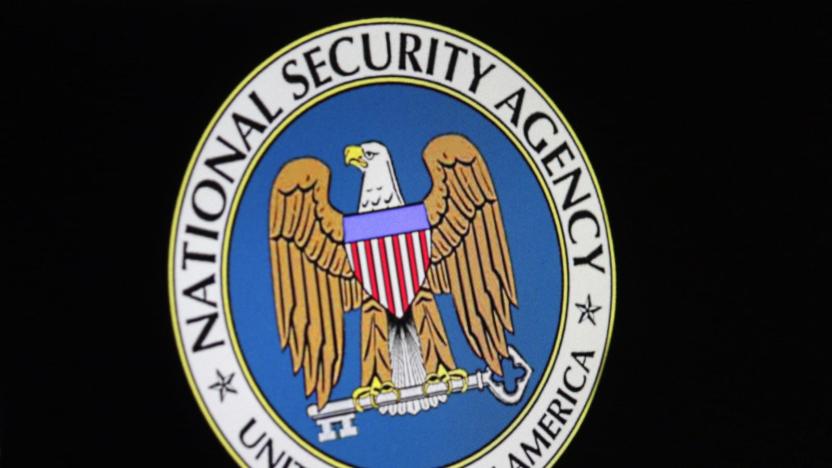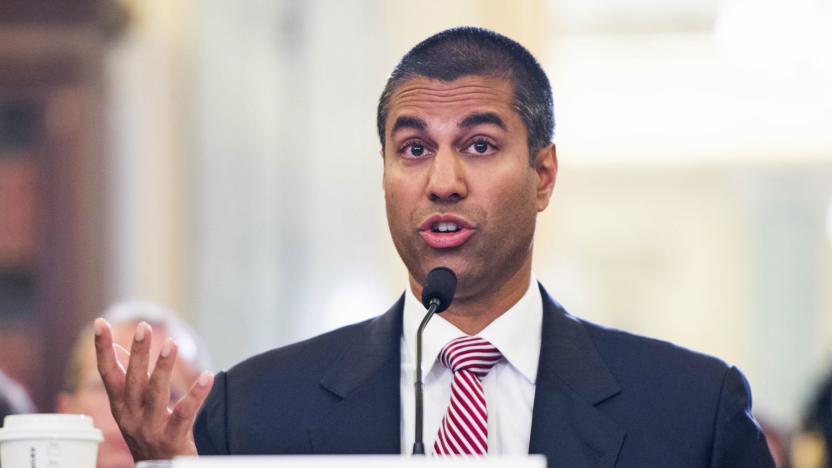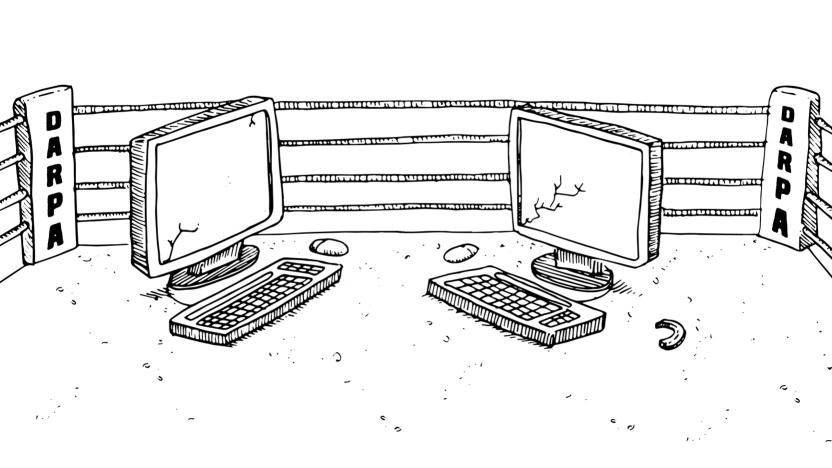EFF
Latest

EFF: Geek Squad has been working with the FBI for a decade
When the defense in a California doctor's child pornography case accused the FBI of paying Geek Squad's crew to look for evidence in the defendant's computer, Best Buy denied it enjoys close ties with the agency. Now, according to the EFF, the big-box retailer's team of IT technicians are even closer to the feds than previous reports indicated. The non-profit has received the results to the Freedom of Information Act (FOIA) it filed last year and found that Best Buy has been enjoying "a particularly close relationship with the agency" over the past 10 years, at least.

How 'sex trafficking' just opened the censorship floodgates
In a 388 to 25 vote Tuesday, the House of Representatives passed legislation that makes websites criminally responsible if they can be seen as facilitating sex work. It still needs to get through the Senate, but with his daughter's endorsement, Trump is anticipated to sign it. Along with its maddening misconceptions about preventing sex trafficking and helping victims, FOSTA-SESTA incorrectly defines sex work and sex trafficking as one thing.

Activist and EFF co-founder John Perry Barlow has died
John Perry Barlow, a founder of the Electronic Frontier Foundation, died in his sleep this morning at the age of 71. EFF executive director Cindy Cohn shared the news in a blog post.

Senate votes to extend NSA’s warrantless surveillance program
Last week, the US House of Representatives voted to renew Section 702 of the Foreign Intelligence Surveillance Act, a law that lets the National Security Agency monitor communications of non-US citizens living outside of the US. Today, the Senate has also voted in favor of renewing the law for another six years.

EFF tool tells your members of Congress to fight for net neutrality
The FCC may be bent on killing net neutrality, but that doesn't mean you have to stay silent or offer mostly symbolic protests. The Electronic Frontier Foundation has created a web tool that makes it easy to ask your members of Congress to fight for an open internet. All you have to do us plug in your address, personalize your message (if you like) and hit "submit" -- your representatives and senators will receive your concerns and hopefully do something about it.

Podcast patent troll's fight might finally be over
We've been covering the frankly absurd claim that Personal Audio LLC owns podcasting for awhile now, but it looks like the patent trolls have finally been stopped for good (for real this time). Back in August, a three-judge panel of US Court of Appeals rendered the organization's patent invalid, and it looked like that was the end of this bizarre legal ride. But Personal Audio LLC wasn't quite finished. The organization's lawyers argued that this three-judge review process violated their client's constitutional right to a jury trial. This week, the appeals court rejected this argument without comment.

Great, now there's 'responsible encryption'
Trump's Department of Justice is trying to get a do-over with its campaign to get backdoors onto iPhones and into secure messaging services. The policy rebrand even has its own made-up buzzword. They're calling it "responsible encryption." After Deputy Attorney General Rod J. Rosenstein introduced the term in his speech to the U.S. Naval Academy, most everyone who read the transcript was doing spit-takes at their computer monitors. From hackers and infosec professionals to attorneys and tech journalists, "responsible encryption" sounded like a marketing plan to sell unsweetened sugar to diabetics.

Privacy group says Washington cyberbullying law is censoring instead
Anti-cyberbullying laws are noble, but attempting to punish online speech is tough. Digital rights group Electronic Frontier Foundation (EFF) claimed that Washington state's anti-cyberbullying legislation goes too far -- and ends up censoring speech instead.

Options for neo-Nazis on the internet are starting to shrink
If you're an American who's ever wondered what it would be like to have had the internet and today's technology during the time of Nazi ascension in Germany, take a look around. You're soaking in it. While a whole lot of us have been aware of this since at least last year's election, it's only now starting to sink in for companies who control the internet. Bitterly, only after the literal killing of people in the streets by white supremacists. Who, until this week, enjoyed using online services for their organizing, sharing, harassing, business needs and getting hateful shit done.

EFF warns blocking neo-Nazi sites may threaten free speech
The Electronic Frontier Foundation (EFF) has criticized internet providers for blocking the neo-Nazi website The Daily Stormer, saying it violates the principals of free speech and could backfire. "We strongly believe that what GoDaddy, Google and Cloudflare did here was dangerous," it said in a blog post. "We would be making a mistake if we assumed that these sorts of censorship decisions would never turn against causes we love."

EFF says border control needs a warrant to search your tech
The Electronic Frontier Foundation (EFF) has submitted a court filing arguing that federal agents at international airports should obtain a warrant before snooping through passenger laptops, phones and other digital devices. Warrantless border searches are currently permissible under an exception to the Fourth Amendment, but as EFF notes, the number of these searches has more than doubled since President Trump moved into the White House.

EFF rates how companies stand up to government data requests
If you're wondering which tech company will protect you in the face of a government request, you may want to check this out. The Electronic Frontier Foundation has released this year's "Who Has Your Back" report, which grades tech giants and some smaller companies based on how they handle government requests for data. Nine companies got perfect scores: Adobe, Credo Mobile, Dropbox, Lyft, Pinterest, Sonic (ISP), Uber, Wickr (a software maker) and Wordpress.

Amazon, ACLU back net neutrality 'day of action' on July 12th
Many tech advocates and companies aren't happy that the FCC is planning to gut net neutrality, and they're determined to make their voices heard. The non-profit group has declared July 12th a "day of action" where companies and organizations will show support for a fair and competitive internet. It's not certain just what those protests will entail, but there are plenty of recognizable names involved. Amazon, Etsy, Kickstarter, Mozilla, Reddit and Vimeo are among the companies throwing their weight around, while groups like the American Civil Liberties Union, the Electronic Frontier Foundation and Greenpeace are also showing solidarity.

ACLU and 170 other groups ask the FCC to keep net neutrality
The current FCC administration is determined to end net neutrality whatever the cost, but that isn't stopping policy groups from making a bid to save it. Over 170 groups (including the American Civil Liberties Union and Electronic Frontier Foundation) have sent a letter urging FCC chair Ajit Pai, Democratic Senator Bill Nelson and Republican Senator John Thune to maintain the 2015 net neutrality order. They believe that treating internet traffic equally is vital to making the internet an "engine of opportunity," and note that broadband investment is up despite internet providers' threats to the contrary. It's also vital to preserving competition and free speech for smaller outfits, the groups argue.

Cloudflare's transparency report reveals secret FBI subpoena
Tech titans like Google and Apple aren't the only ones that receive government requests for customer information -- lesser-known companies like Cloudflare get them, as well. The service, which makes websites load faster, has revealed that it's been fighting a national security letter (NSL) from the FBI since 2013 in its latest transparency report. NSLs are subpoenas the government hands out when it wants to gather information for national security purposes. It also comes with a gag order, which is why the company wasn't able to include the information in previous transparency reports.

How an obscure rule lets law enforcement search any computer
With today's amendments to Rule 41, the statute that regulates legal search and seizure, the US Department of Justice has a new weapon to fight cyber crime -- but it's a double-edged sword. The changes expand the FBI's ability to search multiple computers, phones and other devices across the country, and even overseas, on a single warrant. In an increasingly connected world, amending the rules is both necessary for law enforcement agencies and deeply concerning for digital privacy advocates. And for everyday citizens, it's a little bit of both.

Reuters: Yahoo email scanning done with a Linux kernel module
In the ever evolving saga of Yahoo's email servers and who could peek into them, the latest nugget comes from a Reuters report that the scanning program operated at a deeper level than mail filters for porn or spam. Citing three former employees, it now says the scanning was done via a module attached to the Linux kernel itself. While the more technically-minded wondered why this method would've been employed at all, others like Senator Ron Wyden called for the government to release the FISA order apparently ordering the surveillance.

Hacking and AI: Moral panic vs. real problems
On Aug. 4th, seven different artificial intelligence systems competed against each other to see which was best at hacking. The Cyber Grand Challenge was sponsored by DARPA (the US Defense Advanced Research Projects Agency) and held at Def Con, in a vast ballroom remade to resemble an e-sports broadcast. Of course, because we're talking about about AIs made to seek out security vulnerabilities (and either patch or exploit them), some were inclined to scream "Skynet!" and run for the hills.

EFF sues US government to void 'onerous' copyright rules
The Electronic Frontier Foundation (EFF) has sued the US government in an attempt to overturn a part of the DMCA that it says violates the First Amendment. The provisions, contained in Section 1201, restrict user access to purchased content including videos, music and the software used in cars, appliances and devices. "The First Amendment preserves our right to ... research and talk about the computer code that controls so much of our world," says EFF Staff Attorney Kit Walsh. "Section 1201 threatens ordinary people with financial ruin or even a prison sentence for exercising those freedoms."

FBI's facial recognition system can access 411 million photos
When we first wrote about the FBI's Next Generation Identification (NGI) facial recognition system, we said the agency has access to 70 million photos. Turns out the feds can sift through tons more images than that. The US Government Accountability Office (GAO) has discovered that the FBI actually has access to 411.9 million pictures of Americans and foreigners alike, most of whom have no prior criminal records. FACE can look through NGI's collection, as well through biometric databases ran by the DOJ and 16 different states. It can also search the State Department's passport and visa application records for possible matches.









